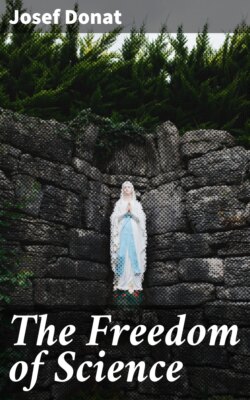Читать книгу The Freedom of Science - Donat Josef - Страница 29
На сайте Литреса книга снята с продажи.
2. Science Retains its Method of Research.
ОглавлениеTable of Contents
But when and how may the scientist be restricted? Here we come to the second point: the directions which faith may give to the profane sciences are in themselves not of a positive but of a negative kind; revelation and Church cannot tell the scientist what he is to assert or defend in the field of the profane sciences, but only what propositions he must avoid. Thus [pg 089] every science is left free to pursue its own method of research. It is not difficult to understand this.
Faith draws from divine revelation; profane sciences, as such, do not draw from divine revelation, but only from experience and reason. Philosophy would cease to be philosophy and become theology did it demonstrate the immortality of the soul by revelation. The anthropologist would cease to be an anthropologist and become a theologian if he would attempt to prove the common origin of mankind by Holy Scripture.
In other words, the profane sciences are distinguished from faith and theology by their formal object, by the end they have in view, by the scientific method with which they handle their subject. Theology, of course, uses revelation extensively; and in this it differs from the other sciences. Hence faith cannot command the anthropologist to defend also in profane science the common origin of the human race from Adam and Eve, because it is held to be a revealed truth. He must say: I believe as a Christian that this is true, established by divine revelation, and no science will ever prove the contrary; but whether I can positively defend this fact as resulting from anthropology, depends on my ability to corroborate it by the methods of this science, that is by the testimony of profane history. And just as little could the historian be required to obtain historical results of which he cannot produce the evidence according to his method.
Therefore faith can only tell the profane scientist that he must not assert anything which is held by faith to be erroneous; that it is false to say there is nothing but force and matter, that the human soul ends in death, or that the various families of the human race have not a common origin. As soon as the scientist knows by faith that a thing is false, he is bound to refrain from asserting it: bound in the first place by the duty to believe, but also by the principles of his own science, which is to find not error, but truth, which forbids to assert what has been proved to be erroneous. Perhaps his own means will not enable him to prove the truth independently of revelation; then from the standpoint of his science he must say, Non liquet.
[pg 090]
The position of the Catholic Church agrees with these principles. She knows, and emphasizes that science has its own method, and hence a natural right and freedom to proceed in its own field according to its method. The Church rejects but one kind of freedom, viz., the freedom to propound a doctrine proved by faith to be erroneous. “The Church by no means forbids these disciplines to use in their own field their own principles and method,” declares the Vatican Council. “But, while acknowledging this lawful freedom, the Church takes care to prevent them from taking up errors in opposition to divine teaching, or from creating confusion by transgressing their limits and invading the realm of faith” (Vat. sess. III, ch. 4. Cf. also the letter of Pius IX., “Gravissimas,”of Dec. 11, 1862, to the Archbishop of Munich, Denz. n. 1666, seq.)
These few remarks show the lack of intelligence in the charge that “Catholic philosophy starts from dogmas and revelation,” or that the Church would dictate to scientists everything they should teach; that, according to its principles it could claim the right “to impose upon a physicist of Zeppelin's era the task of proving the Ascension of Christ or the Assumption of Mary by aërostatic rules.” This is simply gross ignorance or misrepresentation.
